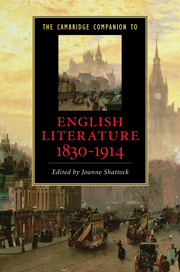Book contents
- Frontmatter
- Introduction
- Part 1 Modes of writing and their contexts
- 1 Authors and authorship
- 2 Readers and readerships
- 3 Life writing
- 4 The culture of criticism
- 5 Women’s voices and public debate
- 6 Writing the past
- 7 Radical writing
- 8 Popular culture
- Part II Intersections and incursions
- Part III The centre and the periphery
- Guide to further reading
- Index
8 - Popular culture
from Part 1 - Modes of writing and their contexts
Published online by Cambridge University Press: 28 November 2010
- Frontmatter
- Introduction
- Part 1 Modes of writing and their contexts
- 1 Authors and authorship
- 2 Readers and readerships
- 3 Life writing
- 4 The culture of criticism
- 5 Women’s voices and public debate
- 6 Writing the past
- 7 Radical writing
- 8 Popular culture
- Part II Intersections and incursions
- Part III The centre and the periphery
- Guide to further reading
- Index
Summary
The drama’s laws the drama’s patrons give,
For we that live to please, must please to live.
Prologue written by Samuel Johnson for Mr Garrick on the opening of the Drury Lane theatre
The demands of living to please and pleasing to live - that uneasy compact between art and commerce - was one of the central anxieties of Victorian cultural life. The words spoken by David Garrick, standing on the Drury Lane stage in 1747, were much quoted by novelists, critics, visual artists, playwrights and essayists throughout the nineteenth century. Dr Johnson’s 'Prologue' speaks of a capricious eighteenth-century audience, but in 1747 Garrick could stand on the stage of Drury Lane and rely on the certainty of his theatre’s monopoly on the 'legitimate' theatre. In the theatre, painting and literature, artists, critics, and audiences had a shared sense of British national culture, its aesthetic qualities and class allegiances. By Victoria’s accession to the throne in 1837, under the complex pressures of industrialization and urbanization, and a vigorous democratic impulse, British national culture appeared fractured and contentious. Artists, critics and audiences were often at odds over what was pleasing, and how that which pleased could - or should - provide a living. While eighteenth-century cultural certainties and coherence may have been a façade reliant on the acceptance of an exclusive Whig ascendancy, this sense of a coherent national culture had, by the start of the Victorian period, disappeared. The contending discourses of national culture, perhaps artfully glossed over before the French Revolution, became overt, and the ideological conflicts of class and gender became part of the very content of much of British culture, particularly that which we have come to see as ‘popular culture’.
- Type
- Chapter
- Information
- The Cambridge Companion to English Literature, 1830–1914 , pp. 147 - 162Publisher: Cambridge University PressPrint publication year: 2010
- 2
- Cited by

